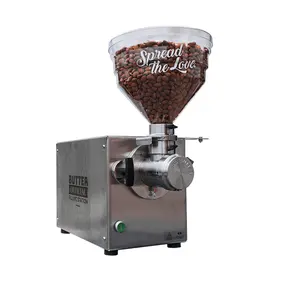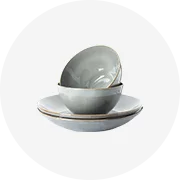What are Mills
Mills are essential kitchen tools designed to grind and crush a variety of food items, including grains, spices, herbs, and coffee beans. They are instrumental for both home cooks and professional chefs who value the flavor and freshness that come from using freshly ground ingredients. These gadgets operate on the principle of applying mechanical force to break down solids into smaller pieces or powders, enhancing their flavor and making them easier to incorporate into dishes.
The workings of mills are relatively straightforward. They typically consist of two abrasive surfaces that, when brought together by manual or electric power, grind the material placed between them. The degree of fineness can often be adjusted, allowing the user to select the desired consistency for their culinary creation. Some mills are equipped with blades that chop rather than grind, which is more suitable for certain types of food items.
Mills come in various sizes and designs, from small hand-held devices suitable for table-side seasoning to larger, more complex machinery used in commercial settings. They are not only functional but can also serve as beautiful additions to kitchen décor. Whether it's a classic wooden pepper mill or a modern stainless steel spice grinder, mills are indispensable tools for those looking to elevate their cooking with the taste of freshly ground ingredients.
Types of Mills
Understanding the different types of mills available is crucial for selecting the right one for your specific needs. Here is a breakdown of some common varieties:
Pepper and Salt Mills: These classic mills are often found in kitchen and dining settings. They work by grinding peppercorns or coarse salt to enhance the flavor of meals. Available in manual and electric forms, they can be made from various materials such as wood, stainless steel, or acrylic.
Spice Grinders: These mills are designed to grind a wide range of dried spices. They usually feature powerful blades or burrs that can handle hard spices like cinnamon sticks or cloves. Spice grinders are ideal for creating custom spice blends or ensuring maximum freshness and potency in your dishes.
Grain Mills: Used primarily in baking and brewing applications, grain mills crush grains such as wheat or barley to produce flour or grist. They can range from small countertop versions for home use to large industrial machines for commercial production.
Coffee Grinders: Critical for coffee enthusiasts, these mills grind coffee beans just prior to brewing to ensure peak flavor and aroma. Burr grinders offer precise control over the coarseness of the grind, which is important for different brewing methods.
Herb Mills: Similar to spice grinders but often designed with larger chambers, herb mills are perfect for chopping fresh herbs finely and uniformly without bruising them, which is often a risk with manual chopping.
How to choose Mills
Selecting the right mill for your business involves considering several factors that will ensure you meet your customers' needs effectively:
Material Durability: Consider the material from which the mill is made—stainless steel, acrylic, or wood—since it will affect its longevity and suitability for different environments like kitchens or dining rooms.
Grinding Mechanism: The type of grinding mechanism determines how well the mill will perform with various substances. Ceramic mechanisms resist wear and corrosion better than metal ones when it comes to salt mills, while hardened steel is preferable for pepper or spice grinding due to its strength.
Capacity: The size of the mill's chamber will dictate how much you can grind at once. Larger capacities reduce the need for frequent refills but may be more cumbersome on a table setting.
Adjustability: A good mill should offer easy adjustability when it comes to grind size. This feature is especially important in commercial settings where consistency across servings is key.
Ease of Cleaning: Hygiene is paramount in any culinary setting. Look for mills that are easy to dismantle and clean as this will ensure flavors aren't transferred between uses.
Design: While functionality is critical, design shouldn't be overlooked—especially if the mills will be used front-of-house. Choose styles that complement your establishment's aesthetic.
Best Mills on Alibaba.com
Alibaba.com stands out as a global marketplace that connects businesses with a vast array of suppliers offering diverse types of mills suited for every conceivable application. Whether you run a café seeking top-tier coffee grinders, a restaurant in need of elegant pepper mills for tableside service, or a retail store looking to stock kitchen gadgets—Alibaba.com caters to all commercial buyer needs with an expansive selection tailored to each industry's unique requirements.
The platform offers an intuitive shopping experience with features designed to simplify international trade. Buyers can communicate with suppliers in their local language and benefit from services like Trade Assurance which safeguards payments until order fulfillment is confirmed. Furthermore, Alibaba.com supports buyers through mobile-friendly browsing and comprehensive order handling services.
By sourcing through Alibaba.com's extensive network of reliable vendors offering quality-assured products across various materials and design styles suited for any room space or occasion, businesses can find premium milling solutions that align with their operational needs and aesthetic preferences—all while benefiting from competitive pricing and personalized trading experiences.
Common FAQs for Mills
What types of mills are best for grinding spices?
For grinding spices, look for spice grinders that are equipped with durable blades or burrs capable of handling hard spices. They should provide consistent grind size and have an adjustable setting for different textures.
How do I choose the right grain mill for my bakery business?
When choosing a grain mill for your bakery, consider the volume of grain you need to process, the fineness of the flour required, and whether you prefer a manual or electric mill. Additionally, ensure the mill is easy to clean to avoid cross-contamination.
Are there specific mills recommended for coffee shops?
Yes, coffee shops should invest in high-quality coffee grinders with adjustable settings to cater to various brewing methods. Burr grinders are preferable for their precision and consistency.
What materials are commonly used in the construction of mills?
Mills can be made from a variety of materials including stainless steel, ABS, acrylic, various types of wood, and aluminum. The choice depends on durability needs and design preferences.
How can I ensure the longevity of my commercial mills?
To ensure longevity, regularly clean your mills according to the manufacturer's instructions and perform routine maintenance checks. Also, choose mills made from durable materials that can withstand frequent use.
Can mills be adjusted to produce different coarseness levels?
Many mills offer adjustability features that allow you to change the coarseness level of the grind. This is particularly important in settings where consistency and customization are required.
What should I consider when selecting salt and pepper mills for my restaurant?
Consider the size, material, grinding mechanism, ease of use, adjustability, and design style. The mills should also be durable enough to withstand frequent use in a restaurant setting.
Are there eco-friendly mill options available for environmentally conscious businesses?
Yes, there are eco-friendly options available such as mills made from sustainable materials like bamboo or those designed to be easily recyclable at the end of their lifespan.
What is the best way to clean and maintain herb mills?
Herb mills should be disassembled (if possible) and cleaned regularly to prevent residue buildup. Follow manufacturer guidelines on whether parts are dishwasher safe or require hand washing.
How do I select a mill if my business requires grinding large volumes daily?
For businesses requiring high volumes of grinding, look for industrial-grade mills with larger capacity chambers, robust construction, and motors designed for continuous use.
Are manual or electric mills better for commercial use?
The choice between manual or electric mills depends on your specific needs. Electric mills offer convenience and consistency for high-volume use, while manual mills may be preferred for their portability and control in smaller settings.
What features make a mill easy to operate?
Features such as one-handed operation, clear viewing chambers, and straightforward adjustability make a mill user-friendly. Electric models with simple button controls can also enhance ease of operation.
How do I choose a mill that won't corrode over time?
Choose a mill with a ceramic grinding mechanism if you're concerned about corrosion, especially with salt mills. Stainless steel is also resistant to corrosion and is suitable for pepper or spice mills.
Can the same mill be used for different spices?
While a single mill can technically grind different spices, it's not recommended due to flavor transfer. Dedicated mills for specific spices are advisable to maintain purity of flavor.
What considerations should I make when purchasing mills for outdoor dining areas?
For outdoor dining areas, opt for mills made from weather-resistant materials such as stainless steel or treated woods. Also consider portability and stability if they need to be moved frequently.







































 浙公网安备 33010002000092号
浙公网安备 33010002000092号 浙B2-20120091-4
浙B2-20120091-4